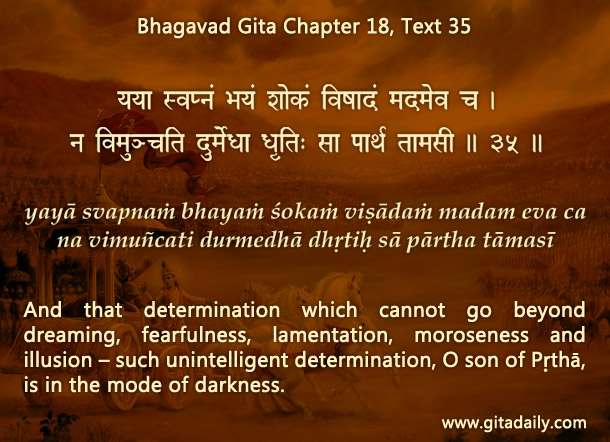Suppose we have made some grievous mistake that has hurt others terribly. Irrespective of whether others forgive us or not, we may refuse to forgive ourselves, thinking, “I need to hold myself accountable for my actions; I need to feel bad about them; I need to beat myself up for what I did.”
Yes, we need to hold ourselves accountable, but the foundation of accountability is reformability. Implicit in the idea that we should pay for the wrong we did is the understanding that we had the power to do the right thing but didn’t. Unfortunately, that very power can become compromised when we refuse to forgive ourselves. By that refusal, we may end up beating ourselves repeatedly and relentlessly for our past actions. Does such self-flagellation actually strengthen us? Rarely; it only weakens and wounds us, decreasing the strength available for us to act rightly. Pertinently, the Bhagavad-gita (18.35) warns that constant moroseness signifies a perverse determination in the mode of ignorance.
Beating ourselves up may make us feel bad about what we did, and we may think that we should feel bad. But the main point relevant for reformation is not how we feel; it is what we do or, more precisely, what we are capable of doing.
Only when we stop beating ourselves up in the name of guilt or shame do we give ourselves the chance to heal — and we free our energy from obsessing over the past so that we can focus on the present, where we can work to both prevent relapses into our past behaviors and make amends for our past actions.
One-sentence summary:
Forgiving ourselves is not meant to excuse ourselves for our past mistakes; it is meant to free ourselves in the present so that we can strengthen ourselves and make amends for those mistakes.
Think it over:
- How does self-flagellation affect us?
- In making up for our past mistakes, what is and is not the most relevant point?
- How can forgiving ourselves help us do the right thing?
***
18.35: And that determination which cannot go beyond dreaming, fearfulness, lamentation, moroseness and illusion – such unintelligent determination, O son of Pṛthā, is in the mode of darkness.
To know more about this verse, please click on the image


Forgiveness mitigate our past sins